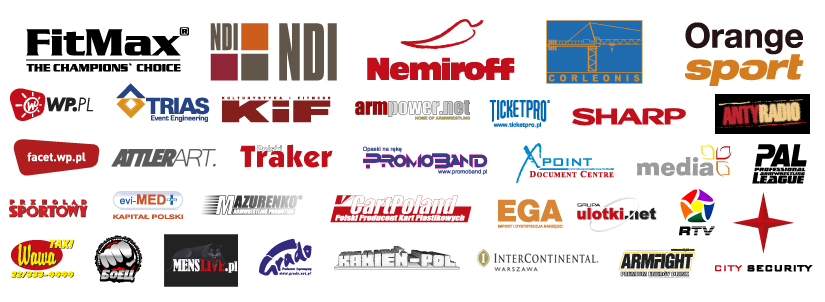The whole drama of the NEMIROFF WORLD CUP in generally the ‘East’ vs. ‘West’ confrontation. It is supported by the long-lasting legend – John Brzenk, on one hand and Russian and Ukrainian heroes on the other. This is what corresponds to fan’s needs.
Luckily in our sport we do not practice vacuous cheering, according to what you’ve got in your passport. And it results from the fact that every Armwrestling fan practiced, or has practiced or will be practicing Armwrestling. And that’s why all the fans chose his own ‘Hero’ form all the sportsman, a hero, whose style and personality are the closest to him. None of the fans goes by the sing on the passport cover.
Our cheering is not limited to blank screaming from tribunes but it strikes the complexity of the fight. The joy coming for the win of the idol is always accompanied by reflection and analysis of the reasons of the win.
Such an individual analysis drive to the try to generalize, what the real difference between the ‘East’ and ‘West’ armwrestlers is? What is the difference in their way of training and fighting?
I’ve tried to analyse it using all the accessible stuff. And guess if I found anything that can easily be call “The basic difference between European and American training”. No, I didn’t!
Training in a combat sport without punches like wrestling, Judo or Armwrestling on a masterly level can be (and it is in fact) individual. Our sport is especially unique and depends on genetic predispositions like the rate of the length of arm and forearm, the way the wrist is built and the size of the hand. There is no such (I guess) other discipline, in which the style of a fighter is so much determined by his or her anatomic built.
There is one more issue, that marks Armwrestling out – pain! Resistance to pain, which is demented in this sport is mostly the result of what was given you by the nature but it also sometimes can be trained both physically and mentally.
It all makes our sport more individual that other disciplines.
Moreover, what is often unnoticed, current training is influenced by all the training cycles, that a player ever had in their life. And it is hard to analyze.
For example if Terence Opperman gets among the leaders (and he has chances to do that), we will be analyzing his trainings and who could determine the influence of the previous rugby and combat sport trainings on his current one.
When Alexey Voevoda will be back form the ice runnels to the table, in the glory of fame who will be able to find out what was the influence of his bobsleigh training on his shape in the fight?
In the following example I’ll refer to a conversation with Allen Fisher from 2001. Allen is now over fifty and he’s been a model of the sports style of life in every aspect. The idea of the healthy nutrition absorbed him completely. Then he was wearing an Indian pouch with herbal capsules on his neck. He made an impression with his muscles shape and a huge forearm, massive hands and long, strong fingers.
We were talking about his training for a long time. I couldn’t believe that he trains just once a week. I made sure, asked some other people to authenticate my translation, and finally I believed him. Allen said “Every human body needs some time to regenerate. You’re what the God made you, training is important but not the most important”.
My miserable knowledge of English didn’t allow me to excavate the plot called “The faith in sports results”. I also couldn’t ask what religion is Allen. Also the Ukrainian whom I noticed to be Orthodox, also participated the conversation. He said that he trained twice a day, six times a week. He referred with restrain to the issue of the God’s matter in case of training.
One day later they both ranked similar at the tournaments.
So in 2001 we could see two different ‘training schools”. Heavy, volume one, based on working with weights, is mostly represented by the Russians, Ukrainians and Belarusians. The second school is mostly focused on working at the table with a spraining partner and very long breaks between trainings, which is used by the ‘West’ players. But can it be called a main difference between the European and American training?
Then I fought it couldn’t.
John Brzenk appeared, talking to him about training gave another excuse for considerations. First of all – John also emphasised the role of regeneration.
Whereas after many long meetings I managed to find some main training matters, which NOTE! didn’t appear in conversations with ‘East’ players. What are they?
- The role of concentration while training. Every training is not a simple “lifting of weights”, it’s a striving for perfect performance of every move and doing your all best.
- And the role of regeneration results from it. I’ve never heard from the American sportsman that they train every day or twice a day.
- The predominance of training at the table over training with weights. If at the table, then mainly with a sparring partner/opponent. Training at the table with the use of rubbers, straps and lifts in on the second place only.
A few years passed…
I’ve recently had an opportunity to acquaint with an account of our envoy to the U.S. How does Todd Hutchings train, I asked?
Twice a day!
Every day!
My theory fell through!
In fact one more thing should be taken into consideration. Where do armwrestlers live, who with do they train every day?
I know, this year John Brzenk trains with Todd Hutchings and - as he calls it “Utah guys”. Does Denis have similar helpers in Moscow? Does Andrey have good sparring partners around him? As far as I know, he lives in a small town. If anyone similar lived there, we would have known it for sure…
I’m in trouble…
On one hand I know that Armwrestling in such countries as Russia, Ukraine or Kazakhstan (the countries of the former Soviet Union) is based on solid foundations. Some time ago, the Soviet Union developed sport not only due to the large amount of talented people. This was the only place where the real sports science was developed. Evidence of that are not only the huge sports universities, which make such ones, as us Warsaw Physical Education University conceal in one department only with the amount of research workers and the access to professional publications.
When Armwrestling was born in Russia, the breakdown of the mighty empire was just taking place. Many trainers of different disciplines who functioned in former national structures lost their jobs. Judo, wrestling, weight-lifting trainers were the ones Armwrestling players, looking for training methods, turned to. And that’s where the domination of the countries of the former Soviet Union in Europe comes from.
And what’s across the ocean? In my opinion, in the range of training methods… not too much.
So where did John “The Legend”, Todd and the others came from? They are not studying Armwrestling, they are not writing dissertations, doctoral nor postdoctoral thesis!
Is there any analogy to another sports discipline in which two schools, Russian and Canadian ones dashed – hockey? Maybe it is so! The Russian school was set to versatile training, same for all. Whereas in Canada, kids just took hockey stick, put on skates and started to play. The effect was that after a few years of ‘confrontation’ of the Canadian professional hickey and ‘amateur’ one form the Soviet Union everything mixed up and equalized.
Will it be so in Armwrestling?
Rather not. In spite of the fact that sports contact on the highest level are quite frequent, it is rather limited to several people a year.
That’s why I think in our sport an individual person will be in the running on a given professional level, not the country on continent they represent.
That’s where I wanted to end my deliberations, but I’ve just counted the number of medals of the teams which came to the World Championships 2012.
After two days Russia got 38 gold medals and the rest of the countries got 34 altogether…
Will these results be similar to the ones at incoming NEMIROFF WORLD CUP 2012? We’ll see in November!
PeSzy



